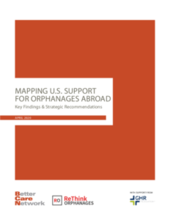In April 2019, the Better Care Network, on behalf of ReThink Orphanages USA, commissioned the U.S.-based policy consultancy, ChildFocus, to begin documenting the ways in which the United States supports and perpetuates overseas orphanages. The following report lays out the results of this preliminary mapping exercise based on: an analysis of existing data; a literature review of U.S government publications and investments; a review of non-profit organizations and foundation activities; an analysis of key supply chains and stakeholders; and the identification of existing data gaps. The report also considers potential levers for federal policy change and includes general recommendations on other potential strategies to redirect critical volunteers and resources away from supporting orphanages and towards family-based care.
Approximately 5.4 million children live in orphanages, although the vast majority have at least one living parent or other family member who might be able to care for them with appropriate supports. Research shows that growing up in institutional care instead of family settings harms children, and yet child institutionalization persists for a number of reasons, including well-intentioned but misdirected financial and volunteer support for orphanages across a variety of U.S. sectors and stakeholders. Grounded in extensive desktop research, the purpose of this mapping exercise was to identify and analyze the main sources of U.S. support for orphanages abroad in order to: better understand the motivations and attitudes behind the decisions to provide these resources; ascertain key trends to inform effective communications and messaging strategies; and identify key organizations and influencers as potential partners in disrupting current orphanage supply chains and effectively re-directing support towards family-based care.
Based on this examination, the mapping exercise identified six main U.S. sectors that contribute most significantly to the support of orphanages abroad. These are: (1) high school, gap year and university study abroad programs; (2) the voluntourism industry; (3) faith-based institutions; (4) U.S.-based charities, foundations and individual donors; (5) the U.S. Government; and (6) “independent influencers,” an informal network of individuals that support orphanages abroad outside of these more established support sectors.
Overall, the mapping exercise found that, while ReThink Orphanages USA and its partner organizations have made considerable progress in educating policy makers, the general public and other key stakeholders about the unintended consequences of orphanages, additional efforts are needed to change the widely held misconception that orphanages and other residential care institutions are “benevolent and necessary” options for children who have been separated from their parents. The mapping also highlighted the need for additional marketing and messaging research to change attitudes and build the necessary relationships to redirect the current flow of volunteers and resources across existing orphanage supply chains.

